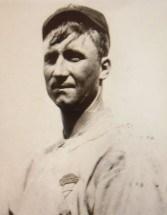Week one of classes has come to an end, and the baseball literature class has thus far exceeded my hopes and expectations. On day one, the professor came into the classroom and commented, “By the way, this class is baseball,” for the benefit of the unsure. His appearance, no doubt, did leave some students unsure, as it was difficult to ignore the all-white mop of hair, the thick glasses, and the large belly — all indications that his days of actually playing any form of baseball were long behind him. He intends to retire at the end of the year, an announcement that made me realize that I could very well be sitting in on the final offering of this course.
Then he started talking, and it quickly became evident that this man’s knowledge of baseball and and its history made my own seem amateurish by comparison, and I certainly know more than the average Joe off the streets. He first taught this class in 1974, and while it has been offered at sporadic intervals over the years, his love for the subject matter shows through. We spent time talking about the Royals and talking about baseball history. He explained, “Of course, we’re going to talk about baseball literature, but we’re also going to talk about history and about what’s going on in the game today. We may even go to a game, and if you don’t know how to keep score… well, you’re gonna learn.”
We have begun bouncing around the stories in The Glory of Their Times, and one figure we focused on in class yesterday was Charlie Faust, the good luck charm of the New York Giants during the 1911 season. Fred Snodgrass discusses Faust’s time with the Giants in his oral history recorded in Glory of Their Times. Faust approached manager John McGraw during spring training, after a Kansas fortune teller supposedly told him that he needed to join the Giants and help them win the pennant. McGraw, being the superstitious type, allowed Faust to join the team, though he did not actually grant Faust an actual salary.

Charlie Faust (Wikipedia)
Faust’s daily needs were covered by the Giants, but otherwise, he mostly just tagged along with the team as a sort-of mascot. Every day, Charlie Faust warmed up as a pitcher, with a windmill wind up against which even Billy Butler could steal his way home. But while Faust believed he was an actual member of the team, he really served as little more than an entertainment piece. Snodgrass describes how fans showed up at the ballpark just to watch Faust warm up, and my own impression as I read Snodgrass’s account was that Faust seemed completely clueless about what was really going on. Throughout his time with the Giants, Faust served as the butt of a countless number of jokes, entertaining crowds and players both. Reading more about the topic outside of Glory, Faust clearly had some mental shortcomings, which Snodgrass hints at, but really doesn’t make clear. Nevertheless, according to Snodgrass, Faust’s presence did turn out to be a good luck charm for the team, as they consistently won while Faust was around, but lost in Faust’s absence. As fate would have it, the Giants did win the 1911 pennant — the first of three consecutive.
John McGraw did put Charlie Faust into a couple of games in 1911, on October 7 and on October 12. He is in the record books as having pitched a total of 2.0 innings, giving up two hits and an earned run for a 4.50 ERA. But while Snodgrass recalls Faust staying with the Giants for a couple more seasons, research by Gabriel Schechter shows that McGraw actually dismissed Faust at the start of the 1912 season, fearing that Faust was becoming less and less an innocent form of entertainment and more and more of an unstable threat to the safety of the team.
Charlie Faust never overcame the disappointment of rejection by, he believed, his true destiny. In 1914, he was sent to a mental hospital in Salem, Oregon. On the admission form to the institution, he listed his occupation as “professional ballplayer.” The hospital diagnosed Faust with dementia, before releasing him into the custody of his brother. Charlie Faust died on tuberculosis on June 18, 1915.





